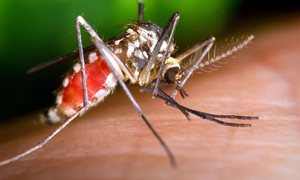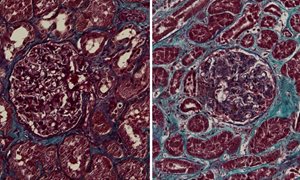
COVID-19 patients who are overweight or obese are more likely to develop a more severe infection than patients of healthy weight, and they require oxygen and invasive mechanical ventilation more often. There is no increased risk of death. These conclusions, for which more than 7,000 patients were studied, appear from international research in eleven countries, including the Netherlands (Radboud university medical center).
The study, led by Australian researchers, examined over 7000 patients from eleven different countries who were admitted to 18 hospitals. Of this group, over a third (34.8%) were overweight and almost a third (30.8%) were obese. COVID-19 patients with obesity required oxygen more frequently and were 73% more likely to require invasive mechanical ventilation. Remarkably, no greater mortality was observed in these groups of patients than in patients of healthy weight. The international results have now been published in scientific journal Diabetes Care.
Immunologist Siroon Bekkering of Radboud university medical center, principal investigator of the Dutch part, explains that never before so many different data on obesity have been combined in one large study. "Several national and international observations already showed the important role of overweight and obesity in a more severe COVID-19 course. This study adds to those observations by combining data from several countries with the possibility to look at the risk factors separately. Regardless of other risk factors (such as heart disease or diabetes), we now see that too high a BMI can actually lead to a more severe course in corona infection."
One explanation for this is that overweight and obesity are characterized by chronic inflammation, which can perhaps lead to increased susceptibility to viruses. This is also the case with the flu virus. Also, obese people are more likely to suffer from shortness of breath, which may lead to an increased need for ventilation.
Different risk factors for severe COVID-19 infection
More risk factors emerge from the study. For example, this study, similar to other international studies, confirms that men are more likely to have a more severe course of COVID-19 infection. In addition, this study also shows that people older than 65 years of age needed supplemental oxygen more often and are at greater risk of death.
Cardiovascular disease and pre-existing respiratory disease may be associated with an increased risk of in-hospital death, but not with an increased risk of using oxygen and mechanical ventilation. For patients with diabetes, there was an increased risk of needing invasive respiratory support, but no additional increase in risk in those with both obesity and diabetes. There was no increased risk of death.
About the Study
Participating in the study were hospitals from the United States, Switzerland, Norway, Denmark, Italy, Austria, China, Singapore, Indonesia, South Africa and the Netherlands. In the Netherlands, Erasmus MC, Franciscus Gasthuis & Vlietland, Amphia ziekenhuis, Bernhoven, Sint Maartenskliniek, Jeroen Bosch Ziekenhuis, Canisius Wilhelmina Ziekenhuis and Radboud university medical center participated.
Publication in Diabetes Care
Diabetes and overweight/obesity are independent, non-additive, risk factors for the in-hospital severity of COVID-19: An international, multi-center retrospective analysis - Danielle K. Longmore, Jessica E. Miller, Siroon Bekkering, Christoph Saner, Edin Mifsud, Yanshan Zhu, Richard Saffery, Alistair Nichol, Graham Colditz, Kirsty R. Short, David P. Burgner.
-
Want to know more about these subjects? Click on the buttons below for more news.
More information
Pauline Dekhuijzen

wetenschaps- en persvoorlichter
Related news items

Field research on malaria vaccine offers unexpected surprise
23 May 2022Field research on the effectiveness of a malaria vaccine, came up with unexpected results for an international group of researchers including Benjamin Mordmüller of Radboudumc. The vaccine evokes a broader response against malaria proteins than there are in the vaccine.
go to page
What does the shingles vaccine teach us about other vaccines? Investigating the role of trained immunity
27 January 2022 The vaccine for shingles, a condition that causes itching, pain, and blisters, is 90% effective, even in elderly. This is remarkable, since most vaccines offer less protection in elderly. Radboudumc is investigating why this vaccine works so well and how it might help us to develop better vaccines. go to page
Tiny blood vessels, big problems Radboudumc receives grant for international collaboration
3 November 2021 The Radboudumc, together with the University of Cambridge, receives a grant of €1.8M from three collaborating cardiac foundations for international research into the small blood vessels in the brain. This study will be led by Neurologist Frank-Erik de Leeuw and internist Niels Riksen. go to page


